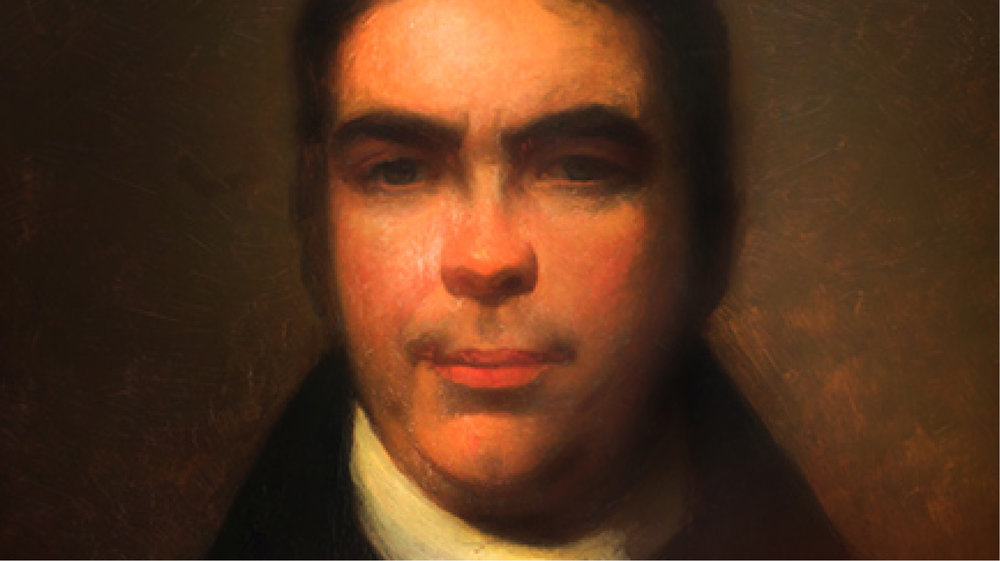Though not university trained, Andrew Fuller (1754-1815) was recognized by his contemporaries as the preeminent Baptist theologian of their day and was awarded honorary doctor of divinity degrees by both Princeton (1798) and Yale (1805). Fuller’s published works, preaching ministry, and churchmanship was, perhaps, the primary mediating agency between the transatlantic and interdenominational evangelical revival, on one hand, and the English Particular (or “Calvinist”) Baptists, on the other hand, who had distanced themselves from what was largely at the start an Anglican renewal movement. Fuller was also well known as a co-founder of the Baptist Missionary Society (or, the Particular Baptist Society for the Propagation of the Gospel Amongst the Heathen [est. 1792]), on whose behalf he itinerated regularly in the British Isles, lobbied the East India Company, and wrote numerous letters and magazine articles during his twenty-two year tenure as its first general secretary. He was an opponent of the British slave trade and, though a dissenting non-Anglican, was an acquaintance of William Wilberforce and other members of the Clapham sect who were key abolitionist allies in Parliament. He was a pastors’ pastor who exerted no small influence for evangelical doctrine and a missionary vision through the many ordination sermons he preached. From 1782 until his death in 1815 he served as pastor of the Kettering Baptist Church and was frequent chairman of the Northamptonshire Association, a consortium that included the likes of William Carey, Samuel Pearce, John Sutcliffe, and John Ryland, Jr.
Fuller was born in 1754 at Wicken, Cambridgeshire, to non-conformist parents who worked a dairy farm. In 1775, six years after his own conversion experience, he was inducted as pastor of the forty-seven member church in Soham, where he had received his baptism and was a member. In 1776 he married his first wife, Sarah Gardiner, with whom he had eleven children, only three surviving beyond early childhood. Sarah would die in 1792, less than two months before the founding of the British Missionary Society (BMS). During this seven-year-long pastorate at Soham, Fuller immersed himself in the literature of Anglo-American evangelical Calvinism. He cultivated his theological perspective and philosophy of ministry by ardent study of the Scriptures alongside the works of the Reformers, seventeenth-century Puritans (especially John Owen), early English Baptists like John Bunyan and John Gill, as well as the writings of American Congregationalist philosopher-theologian and pastor, Jonathan Edwards.
Fuller also acknowledged in his most popular book, The Gospel Worthy of All Acceptation (1781), the influence of the lives of John Eliot and David Brainerd, both late missionaries to the native Americans. The Gospel Worthy was Fuller’s correction of the hyper-Calvinism that denied the propriety of indiscriminate evangelistic appeals. By the 1790s, evangelical (or “strict”) Calvinism was known in England as “Fullerism” (vs. “High” or hyper-Calvinism). The Gospel its Own Witness (1800) was Fuller’s refutation of Deism. Fuller gained a reputation by these two books, especially, for publically, clearly, and systematically opposing in print whatever widely held doctrines he believed were undermining the church and its mission.
In the Northamptonshire Association, Fuller was a member of a thriving intellectual community that was most influenced by Edwards. In 1784 John Sutcliff initiated a “concerts of prayer” movement similar to the program suggested by Edwards in An Humble Attempt to Promote Explicit Agreement and Visible Union of God’s People in Extraordinary Prayer (1748). Baptist congregations prayed monthly for the spread of the gospel and the kingdom of Christ to the ends of the earth through all denominations. In 1791, Sutcliff, Fuller and Samuel Pearce each preached at significant events on the duty of the church to evangelize the whole inhabitable globe (Sutcliff and Fuller at the association meeting of pastors, Pearce at William Carey’s ordination). In one sermon, Fuller based his appeal on the eternal truth of the gospel, the eternal relevance of the gospel, the eternal power of the gospel, and the circumstances of the age that made missionary endeavors possible and obligatory (“Instances, Evil and Tendency of Delay in the Concerns of Religion,” 27 April 1791). Carey’s much touted association sermon from Isaiah 54:2-3 in May of 1792 did not arise in a vacuum. The influence was mutual between Carey and Fuller, both men also being influenced by Robert Hall, Sr. and Samuel Pearce who, in turn, had been inspired by the Methodist Thomas Coke in Birmingham.
On October 2, 1792, the BMS was formed with Fuller its first secretary and the assumption that its support would come largely from the churches of the Northamptonshire Association. When the society sent Carey and John Thomas to India the following year, Fuller preached their commissioning service from John 20:21 (“As the Father has sent me, even so I [Christ] am sending you.”). Fuller believed the mission’s raison d’être was the uniqueness of Christ and the Christian responsibility to proclaim him. Therefore, Bible translation and evangelism should take priority. Whereas it was true that Hindus were neither desiring nor seeking after the Christian Scripture, to ignore and neglect anyone in an unconverted state is inconsistent with the love of God and man. In addition, God had promised to the Messiah the inheritance of the nations (An Apology for the Late Christian Missions to India, 1808). The church is obligated to employ means and make an effort as the means God uses to fulfill that promise to Christ. Obstacles are merely a test to the sincerity of one’s faith, he said.
Fuller spent up to ten hours per day in correspondence and reporting for the BMS. He contributed articles to Evangelical Magazine, Missionary Magazine, Quarterly Magazine, Protestant Dissenters’ Magazine, Biblical Magazine, and Theological Miscellany. He sought financial support via letters and by an average of three months of vigorous itineration each year among various evangelical churches in Scotland, Ireland, Wales and England. John Ryland, Jr. wrote of Fuller’s style, that he, “…always disliked violent pressing for contributions, and attempting to outvie other societies: he chose rather to tell a plain, unvarnished tale; and he generally told it with good effect” (The Works of Faith, the Labour of Love, and the Patience of Hope, illustrated; in the Life and Death of the Reverend Andrew Fuller [1816], 343). Through written correspondence he “pastored” the missionaries in the field while maintaining, in general, a decentralized approach to mission administration. He believed the mature and well proven Calvinist Baptist missionaries were capable of governing themselves and that the time required for correspondence in the early nineteenth century made central control impractical anyway (See Travis Myers, “The ‘Peculiar Qualifications’ and Goals of Frontier Church Planters and Other Missionaries According to the Serampore Form of Agreement [1805]” in Training Leaders International’s Journal of Global Christianity 3.1 [2017] 9-23).
The security of the unlicensed Baptist missionary society’s place in the British Empire was frequently tenuous up to 1813. Fuller occasionally had to petition Parliament or the Board of Control for continued tolerance of the BMS. Muslim irritation at the Christian missionary presence and the conversion of some Indians from Islam had been blamed for the Sepoy Mutiny of 1806. Thomas Twining, a wealthy English merchant, had openly claimed efforts made toward conversion were contradictory to “the mild and tolerant spirit of Christianity.” Fuller responded to Twining and other English defenders of Hinduism with his three-part Apology for the Late Christian Missions to India (1808) in which he argued for a toleration of religion that allows all religious views as well as efforts to persuade through reasonable means. He attributed several social ills, like ritual infanticide and sati, to Hinduism, and commended the missionaries for trying to put an end to such practices.
Fuller was also a critic of the “detestable traffic” of the African slave trade, asserting it made England deserving of ruin at the hands of the French (from whose invasion he urged prayer, nonetheless, that God would mercifully protect England). The prosperity of the empire should not come at the expense of other human beings. Patriotism must “harmonize” with “good will toward [other] men” (“Christian Patriotism,” a sermon of 27 March 1802). On the other hand, Fuller often counseled BMS missionaries not to become “entangled” in political concerns which were “only affairs of this life” and endangered colonial toleration of the mission (letter to John Fountain in India, 25 March 1796, [alluding to 2 Tim 2:3-4]). Because Jesus accomplished “moral revolution” in the heart, loyalty to the British government, rather than revolutionary agitation for colonial independence, should be encouraged as far as it is compatible with Christian commitments (letter to Carey in India, 18 January, 1797).
Fuller, the pastor of families in England and abroad, counseled missionary families to nurture a deep spirituality for the sake of attaining Christian character worthy of the gospel and their mission. Fuller knew the vicissitudes of even the Christian heart, and the “spiritual advantage” of engaging in mission. Reflecting in his diary on July 18, 1794, he wrote:
Within the last year or two, we have formed a missionary society; and have been enabled to send out two of our brethren to the East Indies. My heart has been greatly interested in this work. Surely I never felt more genuine love to God and to his cause in my life. I bless God that his work has been a means of reviving my soul. If nothing comes of it, I and many others have obtained a spiritual advantage. (Peter Morden, Offering Christ to the World: Andrew Fuller [1754-1815] and the Revival of Eighteenth Century Particular Baptist Life, 167.)
Fuller died in 1815. The epitaph stone for Fuller in the Kettering meeting house says he devoted his life for the prosperity of the BMS (“Epitaph on the Late Rev. Andrew Fuller,” in The Baptist Magazine for 1817. Vol. IX, p. 160. London: J. Barfield, 1817). One biographer has said Fuller “lived and died a martyr to the mission” (J.W. Morris, Memoirs of the Life and Writings of the Rev. Andrew Fuller [1826, 2nd edn.], 49). After December, 1794, he was assisted in life by his second wife, Ann Coles. Fuller also spent himself itinerating for the British and Foreign Bible Society after it was founded in 1804. His many occasional writings and sermon manuscripts reveal a love for the gospel message itself and the life-orienting impact of particular Bible texts such as Matthew 28:16-20 and Mark 16:15-16; John 12:36 and 20:21; and Romans 10:9, 14-17. Fuller is noted today for making a significant contribution to the revitalization of Particular (Calvinist) Baptist life in late eighteenth century England as well as for being a key figure in the historic turn toward a proliferation of free Protestant missionary societies at the beginning of The Great Century of global Christian expansion (1792-1910).
Editor’s Note: An earlier (2010) version of this article is posted at Boston University’s History of Missiology online biographical database under the title “Andrew Fuller (1754-1815): Pastor, Apologist, and Promoter of Missions.” Used by permission.




